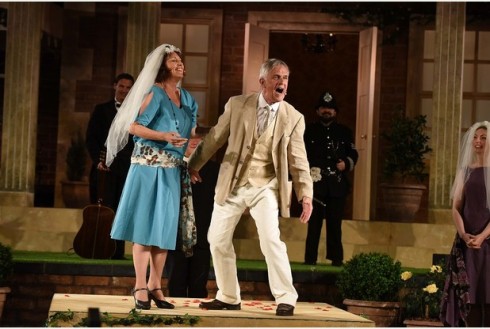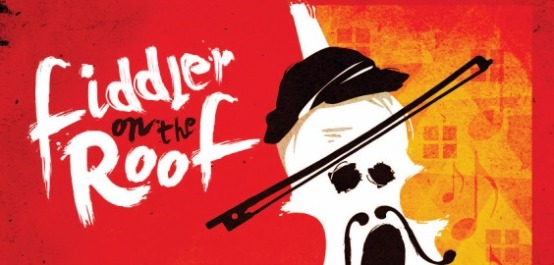THE COMEDY ABOUT A BANK ROBBERY
The REP, Birmingham, Wednesday 29th August, 2018
Mischief Theatre, the group behind the phenomenally successful The Play That Goes Wrong and Peter Pan Goes Wrong, is back with this piece in which everything goes right. Set in 1950s America, there is a B-movie aesthetic to this tale of a diamond heist from a bank in Minneapolis. Writers Henry Lewis, Jonathan Sayer and Henry Shields cram their script with quickfire corny jokes – the opening scene in a prison cell sets the bar low (or high, depending on your point of view) from the start. But such is the conviction of the cast, with their energised, larger-than-life delivery, they get away with even the most groan-worthy lines.
It’s a conventional farce in many respects. Old-fashioned – and that fashion being the commedia dell’arte with stock characters and ludicrous situations, that develop and grow to the point of absurdity. There is plenty of double-talk of which the Marx Brothers and Abbott & Costello would be proud. A lengthy scene in an apartment with a fold-up bed is breath-taking in its complexity. Later, a scene in the bank with the manager and two imposters outdoes everything that has come earlier for sheer silliness. A scene in which the back wall becomes the floor, while the robbers crawl through air vents, is hilariously inventive – theatricality is used as another dimension to the sight gags.
Liam Jeavons brings a dangerous edge to the silliness as lead robber Mitch Ruscitti, his efforts forever punctured by David Coomber’s campily dramatic and incredibly thick Neil Cooper. Damian Lynch is pitch perfect as the gruff bank manager, Robin Freeboys, and Killian Macardie gets more than sufficiently wound-up as stressed FBI officer Randal Shuck. Jon Trenchard is on the receiving end of most of the slapstick violence, in his role as hapless perma-intern Warren Slax, while Ashley Tucker’s Ruth Monaghan (in this performance) delivers most of the sublime singing that covers the scene transitions. At the heart of the piece is the love story between the bank manager’s grifter daughter, Caprice (a marvellously funny Julia Frith) and Seán Carey’s petty crook and con artist Sam. Theirs is a romance of intensely silly situational comedy, but we end up rooting for them all the same. Oh, and George Hannigan plays Everyone Else – including a solo scene in which he miraculously depicts a fight between three of Caprice’s suitors.
David Farley’s set is both stylish and functional, swiftly changing locations while being solid enough to allow extremes of physical comedy. David Howe’s lighting heightens the heist-movie feel – there’s a scene underwater that is just beautiful to see.
An unadulterated joy, this is a comedy with plenty for everyone. The pace never flags so we never lose interest (that’s a banking joke) and then, remarkably, the odd moment of actual drama breaks to the surface – and you could hear a pin drop in the auditorium. The sillier it gets, the more we marvel at the cleverness of the show’s creators, and the seemingly tireless energy of this remarkable ensemble, who rise to the demands of each moment.
I urge you to get a ticket to one of the funniest shows you will ever see – whatever price you pay is a steal. And it would be a crime to miss it, etc…

Making a withdrawal: Liam Jeavons, Julia Frith, and Seán Carey (Photo: Robert Day)



